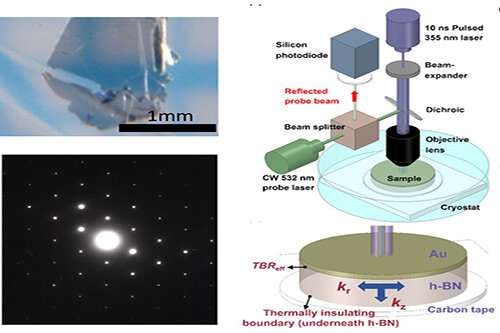New material to pave the way for more efficient electronic devices

Researchers at the University of Bristol have successfully demonstrated the high thermal conductivity of a new material, paving the way for safer and more efficient electronic devices – including mobile phones, radars and even electric cars.
The team, led by Professor Martin Kuball at the Center for Device Thermography and Reliability (CDTR)[MK1] , found that by making an ultra-pure version of Boron Nitride it was possible to demonstrate its thermal conductivity potential for the first time, which at 550W/mk is twice that of copper.
The paper, "Modulating the thermal conductivity in hexagonal boron nitride via controlled boron isotope concentration," is published today in Communications Physics.
Professor Kuball explained: "Most semiconductor electronics heat up when used. The hotter they get, the greater the rate at which they degrade, and their performance diminishes. As we rely more and more upon our electronic devices, it becomes increasingly important to find materials with high thermal conductivity which can extract waste heat.
"Boron Nitride is one such material which was predicted to have a thermal conductivity of 550 W/mK, twice that of copper. However, all measurements to date seemed to show its thermal conductivity was much lower. Excitingly, by making this material 'ultra-pure', we have been able to demonstrate for the first time its very high thermal conductivity potential."
Professor Kuball said the next step was to start making active electronic devices from Boron Nitride, as well as integrating it with other semiconductor materials.
"In demonstrating the potential of ultra-pure Boron Nitride, we now have a material that can be used in the near future to create high performance, high energy efficiency electronics."
"The implications of this discovery are significant. Certainly, our reliance on electronics is only going to increase, along with our use of mobile phones and adoption of electric cars. Using more efficient materials, like Boron Nitride, to satisfy these demands will lead to better performance mobile phone communication networks, safer transportation and ultimately, fewer power stations."
More information: Chao Yuan et al. Modulating the thermal conductivity in hexagonal boron nitride via controlled boron isotope concentration, Communications Physics (2019). DOI: 10.1038/s42005-019-0145-5
Journal information: Communications Physics
Provided by University of Bristol



















